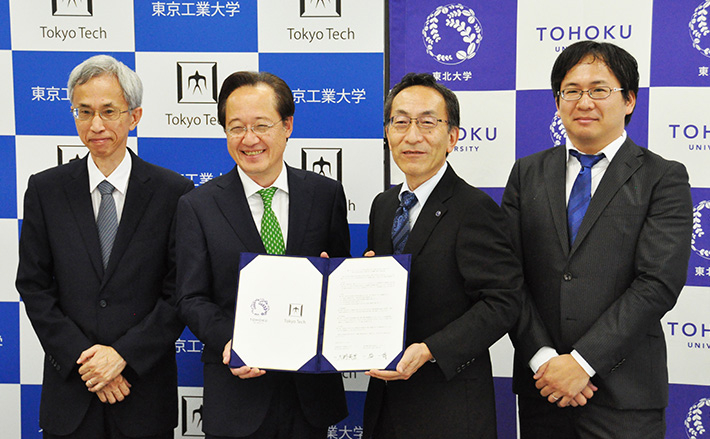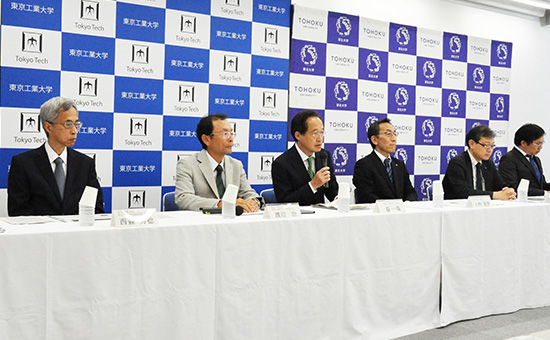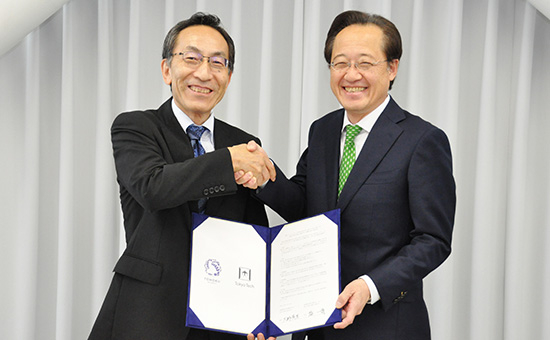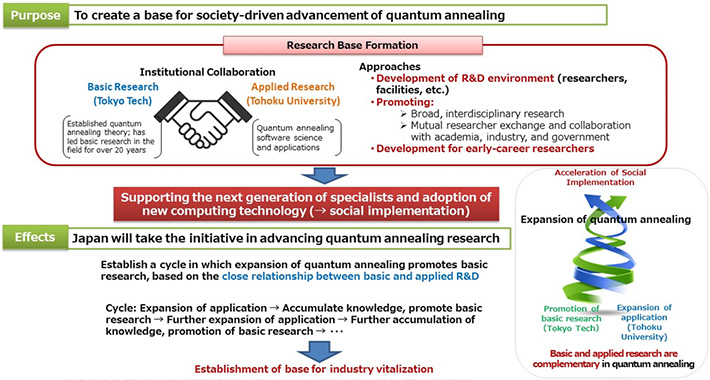Tokyo Institute of Technology and Tohoku University have entered into an agreement to cooperate in information science research centering on quantum computing. The collaboration will allow the two institutions to build upon their respective strengths and form a global base to advance the field of study.

(From Left) Professor Hidetoshi Nishimori of Tokyo Tech, President Kazuya Masu of Tokyo Tech,
President Hideo Ohno of Tohoku University and Associate Professor Masayuki Ohzeki of Tohoku University
With its potential to shorten processing time in complex tasks, quantum computing has attracted attention in a wide range of fields, some of which are out of reach of existing systems.

Press conference at Tokyo Tech on July 18
Tokyo Institute of Technology (Tokyo Tech) proposed the concept of quantum annealing in 1998, and that concept has been applied for many years as the operating principle in widely used commercial devices. This fundamental theory from 20 years ago has now become one of the world’s most influential scientific fields.
Tohoku University is a global leader in applied research on quantum annealing and related software sciences, and has developed solutions to important issues through broad cooperation with industry.
Utilizing this extensive experience, the Quantum Computing Unit*1, established at Tokyo Tech’s Institute of innovative Research (IIR) on July 1, and the Q+HPC Data-Driven Social Infrastructure Development Base*2, an interdisciplinary priority research institute at Tohoku University, are collaborating to form a central base for quantum computing research. They will also use their combined strengths to organize the Quantum Annealing Research and Development Consortium (tentative name), through which they will cooperate with industry on solving a wide range of problems facing society.
The new research base will create an environment which brings together specialists and provides the necessary facilities for quantum annealing R&D. They will also contribute to the establishment and development of basic theories on quantum annealing studied by the Quantum Computing Unit, as well as software science and applications worked on by . Basic and applied research are close and complementary; therefore, expanding application of quantum annealing to other fields will be useful not only to accumulate knowledge, but also to encourage the development of basic research. In this way, developments in basic and applied research will create a virtuous cycle.

Ohno(left) and Masu
Areas of collaboration
- 1.
- Promoting broad, interdisciplinary research
- 2.
- Promoting mutual researcher exchange and collaboration with academia, industry, and government
- 3.
- Development for early-career researchers
- *1
- The Quantum Computing Unit engages in a broad range of research topics, from the establishment of basic theories in quantum annealing to societal applications. The unit strives to establish itself as the primary location for quantum annealing research in Japan.
- *2
- the Q+HPC data-driven research center for creation of science and technology engages in research based on three pillars: development of integrated optimization technology using quantum annealing, development of human resources, and application to society.
. Any information published on this site will be valid in relation to Science Tokyo.






